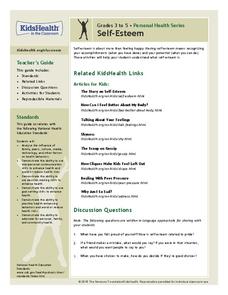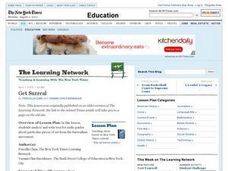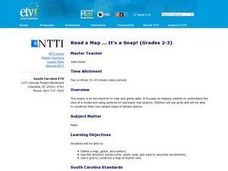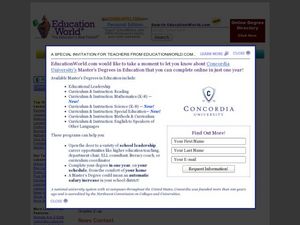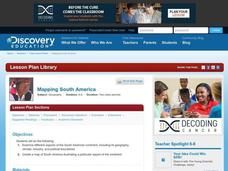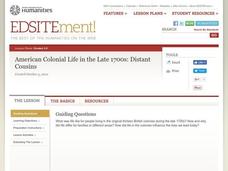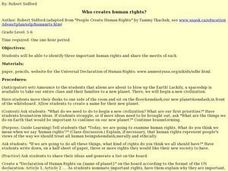Curated OER
Self-Esteem
Students determine what contributes to their self-esteem. For this self-esteem lesson, students participate in a discussion by answering a list of questions. They complete two handouts; one entitled "Who's in the Mirror?" and another...
Curated OER
'No Cussing' Clubs Catching on with Kids
Students read a news article about a boy in California who wants to encourage his peers to use good language. In this current events lesson, the teacher introduces the article with a short rap, discussion, and vocabulary activity, then...
Curated OER
Know The Code
Students explore how codes of conduct guide our daily lives. After learning about specific codes of conduct, students write articles exploring aspects of different codes and how they affect people in their community.
Curated OER
Get Surreal
Students analyze and write text for audio guides about particular pieces of art from the Surrealism movement.
Curated OER
Following Muddy's Trail
Students view the AMERICAN MASTERS film "Muddy Waters: Can't Be Satisfied" and research him using the Guided Reading strategy. They examine the influential musician's childhood and trace his journey from the Mississippi Delta to...
Curated OER
You Are What You Eat: Lessons from Alice Waters
Students view the AMERICAN MASTERS episode titled ALICE WATERS AND HER DELICIOUS REVOLUTION. They examine their own eating habits and determine how they can eat food that is both healthier and tastier. Through Guided Reading strategies,...
Curated OER
Are We the People?
Students investigate their elected officials and their roles. In this governmental leadership lesson, students discuss the Constitution and research their elected officials. They also organize the information they find regarding the...
Stanford University
The 1898 North Carolina Election
Pupils discuss why the Democrats defeated the Fusion ticket in the 1898 North Carolina election. In this content area reading instructional activity, learners explore three primary documents and answer guiding questions that help them...
Curated OER
Classroom Ethics/Means & Ends
Students explore different aspects of ethics. For this ethics lesson, students ponder the idea of ethics, and the concepts of the ends and means and action justification. Students will write a reflective paper after a class discussion.
Curated OER
The Massachusetts 54th Regiment: Honoring the Heroes
Students use art and images analyze the Civil War. In this lesson on the Shaw Memorial, students engage in 3 activities, discussion, and art analysis to better comprehend the events of the Civil War. This lesson includes web resources,...
Curated OER
An Orderly Wagon Train Migration
Sixth graders work in small groups to organize a wagon train for a trek westward. They determine leadership responsibilities and rules needed to make a successful trek.
Curated OER
Native American Basket Making
Students design a unique basket plaque incorporating at least one symbol from their chosen tribe. They also identify, share, and give rationales for the symbols in basket plaques. Whole class discussion jig-saws their discoveries.
Curated OER
Legally Wed
Students explore the controversial topic of same-sex marriages in a fishbowl discussion. They write balanced news articles based on interviews exploring people's opinions on laws that define marriage.
Curated OER
The Constitutional Convention: What the Founding Fathers Said
Young scholars critique the Creation of the U.S. Constitution. They list some ideas proposed and debated during the Constitutional Convention. Discussion of the important issues requiring compromise are examined.
Curated OER
Read a Map ... It's a Snap!
Students are introduced to map and globe skills. They use grids and are able to construct their own simple maps of familiar places. Students are able to define a map, globe, and symbol and use the direction words north, south, east,...
Curated OER
From the School House to the White House
Students recall visits to museums, then read a news article about a museum exhibit that shows what U.S. presidents were like during their childhood. For this U.S. history and current events lesson, the teacher introduces the article with...
Curated OER
A Town on the Move
Students evaluate the moving of buildings, then read a news article about one town relocating building to save their economy. In this economics and current events lesson, the teacher introduces the article with a discussion and...
Curated OER
A Question, Mr. Lincoln!
Students discuss Abraham Lincoln. In this social science lesson, students describe key events in Lincoln's life. Students practice using interviewing skills to gather information pretending to be Lincoln.
Curated OER
Mapping South America
Learners explore South America. For this South American lesson, students use their geography skills to create population, terrain, biomes/vegetation, and major exports maps. Learners present their finished maps to their classmates and...
Curated OER
The Aftermath of Genocide
High schoolers read and discuss articles written about the Rwandan genocide. They participate in a class discussion, and write a letter to the U.N. or a letter to the editor of their local newspaper.
Curated OER
American Colonial Life in the Late 1700s: Distant Cousins
Learners explore daily life and its influences in the late 1700s for two families in different colonies- Delaware and Massachusetts by becoming historical detectives. After gathering information from artifacts to make inferences about...
Curated OER
Who Creates Human Rights?
Students examine the importance of human rights. They participate in a simulation of starting a new civilization on another planet, create a class "Declaration of Human Rights," and write a journal entry based on class discussion...
Curated OER
Trading Rendezvous
Students explore the fur trade between the settlers and Native Americans. Through class discussion, students explain and give examples of how the fur trade worked. In groups, they simulate the fur trade using materials provided by the...
Curated OER
Thematic Maps of Your School
Students are able to list the essential elements of a thematic map, understand and use scale effectively to represent a geographic area, use research skills to develop a body of information, plan and draw an accurate thematic map based...


